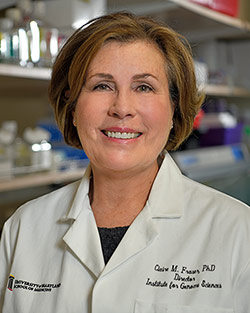December 16, 2020 | Deborah Kotz
Comprehensive New Resource Provides Potential for New Vaccines and Therapeutics
 Researchers at the University of Maryland School of Medicine published one of the most comprehensive analyses of how genes get expressed during infection (known as a transcriptome). The analyses include three different strains of the bacteria Streptococcus pneumoniae, which causes pneumonia, meningitis and middle-ear infections. It also includes analyses of the lungs and four other organs in an animal model where the bacteria resides, multiplies and takes hold in the body. Their findings were published today in the Proceedings of the National Academy of Sciences.
Researchers at the University of Maryland School of Medicine published one of the most comprehensive analyses of how genes get expressed during infection (known as a transcriptome). The analyses include three different strains of the bacteria Streptococcus pneumoniae, which causes pneumonia, meningitis and middle-ear infections. It also includes analyses of the lungs and four other organs in an animal model where the bacteria resides, multiplies and takes hold in the body. Their findings were published today in the Proceedings of the National Academy of Sciences.
“Our new analysis provides valuable new information about the animal host and pathogen interactions that take place during pneumococcal infections,” said study principal investigator Hervé Tettelin, PhD, a Professor of Microbiology and Immunology, and scientist at the Institute for Genome Sciences in the University of Maryland School of Medicine. “It could ultimately help researchers develop new treatments for this bacterial infection.”
Symptoms of pneumococcal infection can include fever, cough, shortness of breath, chest pain, stiff neck, confusion, increased sensitivity to light, joint pain, chills, ear pain, sleeplessness, and irritability, according to the Centers for Disease Control and Prevention. With the introduction of the first pneumococcal vaccine in 2000, deaths attributable to these infections have declined. However, increasing antibiotic resistance have made some of these infections more difficult to treat.
The University of Maryland School of Medicine researchers collaborated with researchers at the University of Alabama at Birmingham and Yale University School of Medicine to analyze gene expression in various infection sites including the nose and throat passages, the heart, bloodstream, lungs, and kidneys. They created an atlas from this gene expression data and found that the bacteria behaves differently depending on which site it infects within the mouse model, and the mouse organs, in turn, also respond differently. They also found certain S. pneumoniae genes were always highly expressed at all anatomical sites, which makes them ideal targets for new vaccines or therapies. In an animal challenge experiment, the researchers found that an anti-inflammatory treatment called interferon beta worked to prevent the bacteria from invading vital organs.
“This promoted host survival and provided us with important insights into potentially new avenues for treatment,” said study co-author Adonis D’Mello, a graduate student in molecular medicine at the Institute for Genome Sciences. “We were able to build upon analytical pipelines to provide a more comprehensive way of studying diverse systemic pathogens.”
 Funding was provided through the Merck Investigator Studies Program that supports hypothesis-generating clinical and pre-clinical research that is initiated, designed and implemented by external investigators. This project was also supported with funds from the National Institutes of Health, National Institute of Allergy and Infectious Diseases.
Funding was provided through the Merck Investigator Studies Program that supports hypothesis-generating clinical and pre-clinical research that is initiated, designed and implemented by external investigators. This project was also supported with funds from the National Institutes of Health, National Institute of Allergy and Infectious Diseases.
“This research by Dr. Tettelin and colleagues leverages the capabilities within the Institute for Genome Sciences to advance our understanding of host-pathogen interactions” said Claire Fraser, PhD, Dean’s Endowed Professor and Director of the Institute for Genome Sciences. “The ultimate goal of these kinds of studies is to improve the treatments for infectious diseases.”
“This is a very exciting basic research finding that could have widespread implications in our understanding of a potentially dangerous infectious disease,” said E. Albert Reece, MD, PhD, MBA, Executive Vice President for Medical Affairs, UM Baltimore, and the John Z. and Akiko K. Bowers Distinguished Professor and Dean, University of Maryland School of Medicine. “It also has broader applicability for the field of transcriptome research to identify potential new treatments for diseases.”
About the University of Maryland School of Medicine
Now in its third century, the University of Maryland School of Medicine was chartered in 1807 as the first public medical school in the United States. It continues today as one of the fastest growing, top-tier biomedical research enterprises in the world -- with 45 academic departments, centers, institutes, and programs; and a faculty of more than 3,000 physicians, scientists, and allied health professionals, including members of the National Academy of Medicine and the National Academy of Sciences, and a distinguished two-time winner of the Albert E. Lasker Award in Medical Research. With an operating budget of more than $1.2 billion, the School of Medicine works closely in partnership with the University of Maryland Medical Center and Medical System to provide research-intensive, academic and clinically based care for nearly 2 million patients each year. The School of Medicine has more than $540 million in extramural funding, with most of its academic departments highly ranked among all medical schools in the nation in research funding. As one of the seven professional schools that make up the University of Maryland, Baltimore campus, the School of Medicine has a total population of nearly 9,000 faculty and staff, including 2,500 student trainees, residents, and fellows. The combined School of Medicine and Medical System (“University of Maryland Medicine”) has an annual budget of nearly $6 billion and an economic impact more than $15 billion on the state and local community. The School of Medicine faculty, which ranks as the 8th highest among public medical schools in research productivity, is an innovator in translational medicine, with 600 active patents and 24 start-up companies. The School of Medicine works locally, nationally, and globally, with research and treatment facilities in 36 countries around the world. Visit medschool.umaryland.edu
Contact
Deborah Kotz
410-706-4255
dkotz@som.umaryland.edu
Related stories

Thursday, March 22, 2018
With Big Data, Researchers Identify New Targets for Lung Disease Treatments
Every year, approximately 12 million adults in the U.S. are diagnosed with Chronic Obstructive Pulmonary Disease (COPD), and 120,000 die from it. For people with COPD, Haemophilus influenzae, a bacterium, can be particularly dangerous.

